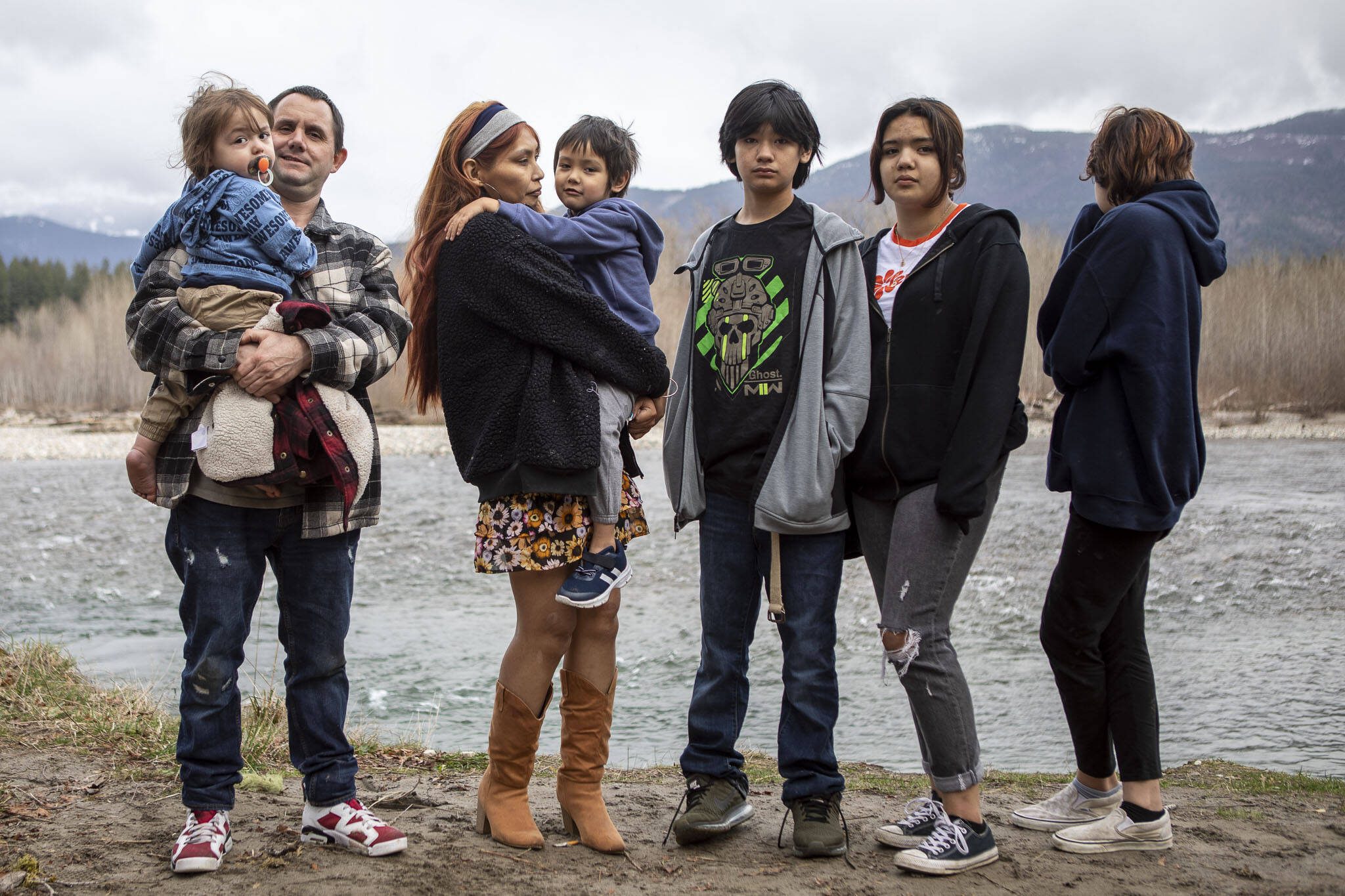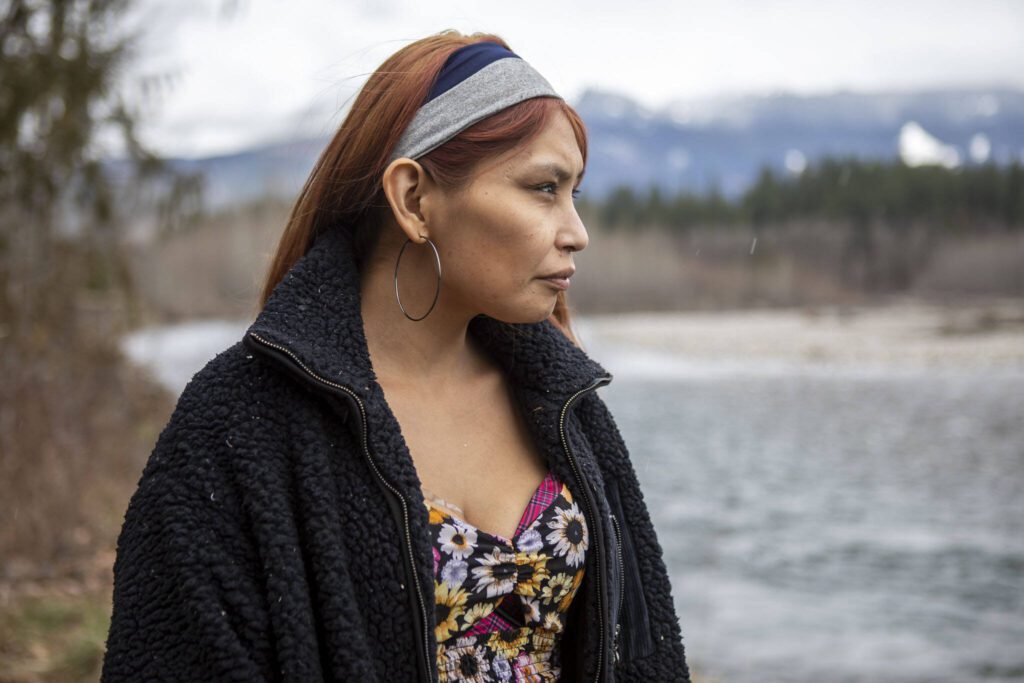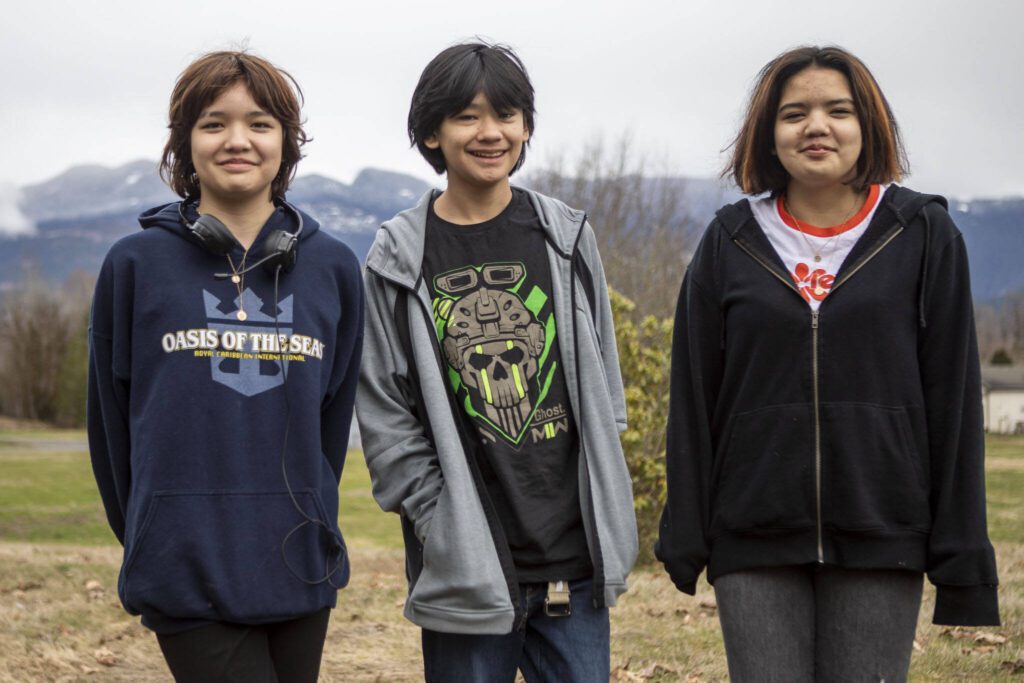SAUK-SUIATTLE RESERVATION — Emily Joe Bill has been dead for 54 years, but Sauk-Suiattle tribal leaders are still arguing over whether she, and at least 31 of her descendants, belong in the tribe today.
Five times in the past 35 years, her status as an enrolled Sauk-Suiattle member has changed — affecting health care, housing, job opportunities, tribal payments and education access for everyone enrolled through her lineage. Disenrollment also denies her descendants their sense of identity.
In the latest battle beginning in 2021, the tribal council once again voted to disenroll Emily Joe Bill.
Since then, Khrista Bill has been fighting back.
The legal case purports to be about genealogy — and whether Emily Joe Bill should have ever been counted as Sauk-Suiattle in the first place — but the Bills and some other prominent members of the 314-person tribe argue the disenrollment effort is rooted in shady political and personal agendas.
They contend the case is a way for current tribal leadership to monopolize power. Some also assert it’s a way to silence Khrista Bill’s daughter, who publicly accused another tribal member of kidnapping and raping her in fall 2020, when she was 12 years old.
Within two months of the disenrollment ruling, Khrista Bill and her six children were forced off the reservation with a “no cause eviction.” She had just given birth to her youngest. Khrista Bill carried her newborn son on her hip as they vacated their two-story turquoise home on Chief Brown Lane. Young kids trailed along after her to the family’s car. Her fiancé Shawn Haggard shut the door behind them.
With no real destination, the Bills drove away. They spent Christmas in a motel, watching their savings dwindle.
They’ve been bouncing between homes ever since.
Reclaiming ancestors
Emily Joe Bill was born in 1895, according to tribal court documents.
Her father and mother were both listed in the Suiattle River Allotments as members of the Suiattle Indian Tribe in the 1800s, according to historical documents. Her mother, Annie Joe, died in 1913 and was buried in the Sauk-Suiattle cemetery. Annie Joe’s gravestone can still be seen on tribal lands just north of Darrington. The reservation is about a 40-minute drive past Arlington up Highway 530, in the shadow of Whitehorse Mountain, known in the traditional language as Sobah-Li-Ali.
In 1942, the U.S. Bureau of Indian Affairs conducted a census of Native American people that is still used today by local tribes to determine their base rolls.
When the bureau came around to conduct the census, Emily Joe Bill was in Canada, so the bureau didn’t count her, according to Richard Pope, the Bills’ lawyer.
Emily Joe Bill died in 1969.
Four years later, the Sauk-Suiattle Tribe gained federal recognition and set out to retroactively correct ledgers of the past and reclaim their ancestors.
In the early 1900s, Native American censuses could be flawed — and many were, as Pope explained across multiple interviews: Native Americans had only just gained U.S. citizenship in 1924; many tribes were yet to be federally recognized; and as the federal government made the rounds for its tribal census in 1942, World War II raged and the effects of the Great Depression lingered.
There are no known documents recording exactly why the 1988 Sauk-Suiattle Tribal Council found Emily Joe Bill met the enrollment requirements, but the fact that her parents owned allotments on the reservation could be a clue, Pope said.
Tribal elder Norma Joseph was present when the Sauk-Suiattle Constitution and bylaws were drafted in 1975. She testified in the Bills’ recent disenrollment case, explaining how the council originally crafted enrollment requirements to be “extremely broad because the elders wanted to make it possible for those with ancestors at the tribe to have a place to call home,” according to court documents.
Whatever the deciding factors may have been, the tribal council added Emily Joe Bill to the base roll in 1988. She officially became Sauk-Suiattle in the tribe’s new written history.
As did her descendants.
‘Like it was all my fault’
The Sauk-Suiattle Tribal Council is made up of seven positions, and those elected hold a lot of power in the community.
Currently, a single family holds the chair, vice chair and treasurer positions: Nino Maltos Jr., his father Nino Maltos Sr. and the chair’s sister Demi Maltos. Another council member, Robin Enick, descends from the same ancestral line as the Maltos.
In December 2020, Khrista Bill ran for a seat on the council. She lost by 8 votes, but she believes the votes were not counted properly.
The election came a month after her daughter reported she was raped on tribal lands.
In an interview with The Daily Herald, the girl, now 15, said she had just come home from school and was chasing her dog through the yard.
“Out of nowhere, I feel a huge thing on my head,” the girl said. “Everything was not black, but it all flashed too bright.”
She said she remembers waking up and being confused to find Travis Navarro, a tribal member in his late 20s whom she had considered a friend, dragging her through the field.
The girl said she was threatened, beaten and raped behind a cabin and then inside a house. Khrista Bill and Haggard went door to door looking for the girl and called tribal police. Around 9 p.m., she escaped. The Bills’ home was sandwiched between Nino Maltos Jr. and Nino Maltos Sr. In a daze, the girl recalled, she went into one of their homes and told the Maltos what happened.
The Maltos “acted like they were there, and they were listening and they were worthy of hearing the story, but they weren’t really,” she said “… They made me feel so embarrassed.”
Later that evening, the girl reported the rape to tribal police, and she went to Providence Regional Medical Center Everett for a sexual assault examination. The tribe’s then-police chief, Sherman Pruitt, passed the investigation to the FBI, as is common for serious criminal allegations on Native American reservations. The girl has a no-contact order against Navarro.
On Dec. 8, 2021, about a year after the rape report, a grand jury indicted Navarro for one count of sexual abuse of a minor in U.S. District Court in Seattle. A jury trial is tentatively set for June.
“I felt like it was all my fault,” the girl said, looking down. “Like I got my family evicted because I came forward about the rape. If I’d kept quiet, maybe we’d still have a home.”
Members of the Sauk-Suiattle Tribal Council did not respond to a reporter’s numerous attempts to reach them by phone and email for over a month.
‘All retaliation’
Eight months after the rape report, while charges were still pending, the tribe held a youth event at Wild Waves in Federal Way.
Khrista Bill’s daughter had been excited for what she thought would be a fun summer event. But according to other attendees, Navarro showed up. A heated argument broke out between the Maltos, the Bills and Navarro.
The Maltos “invited him to come and gave him a ticket to get in, knowing that (Khrista Bill’s daughter) was there, and that there was a no-contact order,” Haggard said. “Even if it is off the reservation land, it’s a youth and family gathering for the tribe.”
The Bills ended up leaving, fuming with anger, Haggard said.
Back on the reservation, the girl scrawled chalk messages on the pavement outside the Maltos family home.
“Predator supporter.”
“No one cares.”
Days later, on July 29, 2021, the Sauk-Suiattle Tribal Council mailed out notices to Khrista Bill and at least 30 other descendants of Emily Joe Bill. A disenrollment hearing was set for for Aug. 31, according to court documents.
In September, the council decided Emily Joe Bill had been “improperly listed on the 1942 census” by the 1988 tribal council, thus her descendants failed to “meet the requirements of lineal descendancy.”
Khrista Bill lost her job as an interim housing coordinator for the tribe. So did her fiancé, who was facilities director on the Sauk-Suiattle Reservation. The tribe also pays its members $300 in monthly stipends — and Khrista Bill and her six children lost those payments.
“It was definitely all retaliation,” Khrista Bill said.
‘Differing conclusions’
The Bills have spent well over a year in and out of motels. Their savings are gone.
“Everybody’s scared of them,” Khrista Bill said, referring to the Maltos. “Nobody has the guts to stand up to them. But I did. And look what happened.”
Pope, an attorney for Lake Hills Legal Services in Bellevue, took on the disenrollment case pro bono. He submitted an appeal brief in November 2021, shortly after the eviction.
Pope and Bill could have argued the case through several avenues.
Khrista Bill’s enrollment is based on her mother’s side, lineage that extends to Emily Joe Bill, but she could have legally argued to be re-enrolled on her father’s side, who is also Native American. On either side of her parentage, Khrista Bill and her kids would all meet the one-quarter “blood quantum” standard used by the Sauk-Suiattle Tribe.
However, about 30 others could face disenrollment without Emily Joe Bill. Khrista Bill and Pope decided to appeal on the grounds that her enrollment should be reinstated, to protect the whole line, even though that argument has proven precarious in the past.
“The nuance within this dispute lies in the fact that four Councils have considered the same evidence, and have reached differing conclusions,” Judge Josh Williams later wrote in his ruling in Sauk-Suiattle Tribal Court.
David Wilkins, professor at the University of Richmond and a citizen of the Lumbee Colombian Nation in North Carolina, coauthored a book on tribal disenrollment, “Dismembered,” in 2017.
There was a surge in disenrollment cases beginning in the 1990s, when tribes began to question who stood to gain from revenue at casinos, he told The Daily Herald in an interview. (The Sauk-Suiattle Tribe’s casino opened in 2019, but closed about a year later and was converted into a gym.)
Wilkins found at least 80 tribes who have tried to disenroll members or deny tribal citizenship.
“When we survive so many things that have been thrown our way by the states, by the federal government, and yet now we are at war with our own cells,” Wilkins said. “We’re cannibalizing our own members.”
Across the United States, disenrollment “tends to involve political power” and personal issues, Wilkins said. Traditionally, he added, tribes may have banished members, but stripping tribal members of their identity was unheard of until more recently.
“Until and unless the federal government finds some way to put pressure on the tribal governments, I don’t see it lessening,” he said. “Because right now, they just really have free rein to do whatever they want to do with their own relatives. And that’s what’s so disheartening about this whole process.”
The original rift
Emily Joe Bill’s right to be in the tribe was first questioned in 2005.
At that time, two of her descendants, John Bill and Gloria Bill, held seats on the Sauk-Suiattle council. Months of bitter resentments created a rift in tribal government. Members of the Bill family signed on to a 13-page letter alleging mismanagement, in an effort to alert the federal Bureau of Indian Affairs.
The same month, the council held an emergency meeting to disenroll members of the Bill family, saying it was necessary to protect the integrity of the tribe’s membership, as reported by The Herald at the time. A month later, the Sauk-Suiattle Tribal Court granted an injunction, and the council gave the members another chance to document their membership status.
In 2005, tribal member Nancy DeCoteau argued the written census could have been flawed and oral records were more reliable. And around the turn of the century when Bill was born, “we didn’t have the English language to rely on,” DeCoteau said.
The then-tribal chairwoman, Gloria Green, countered that allowing the Bills to stay “could set a precedent to just allow anyone to join the tribe.” Some said the move was a political tactic to remove two outspoken voices on the tribal council. Green disagreed.
“If they want to call it political, that’s their own political agenda,” Green said.
Green is the mother of Khrista Bill’s fiancé, Haggard.
Before the disenrollment vote in 2005, John and Gloria Bill were removed from the council. Ronda Metcalf was appointed to fill one of the vacancies, but in an agreement with the council, she recused herself from the vote.
“They wanted all the Bills out,” Metcalf said in an interview this month. “The Bills were such a big family. They had sway in votes.”
‘A different majority’
On July 1, 2005, the tribal council voted to revoke Emily Joe Bill’s membership.
Without proper documentation of why the earlier council added Emily Joe Bill to the 1942 census, her Sauk-Suiattle lineage was unfounded, the council ruled.
“Nobody appealed from that resolution in 2005, which I think is a bit of a difference from how things are now,” Pope said. “… And then, a couple months later, they had some proceedings to remove some of her descendants.”
At the time, the decision affected at least 15 people, but it didn’t affect all of them directly.
Some had membership in multiple tribes and could seek a new home with the Swinomish or Upper Skagit. Some hadn’t lived near Sauk-Suiattle land for decades. Some had died.
Back then, they did not remove Khrista Bill, who was still a minor.
In 2015, the tribal council revisited the Emily Joe Bill question, according to court documents.
“You think having a different majority in the United States Congress changes things?” Pope said. “Well, having a different majority on a tribal council can change things a lot more quickly.”
The council determined the 2005 decision “was never approved by the Bureau of Indian Affairs, and therefore lacked legal effect.” So the council rescinded the decision, reaffirming Emily Joe Bill’s place on the base roll.
For the second time since her death, she was an enrolled member of the Sauk-Suiattle tribe.
‘Null and void’
After the chaos of the past three years, Khrista Bill said she’s not sure anymore if she wants to move back to the reservation. Her family is still fighting for a place in the tribe, but the division is deeper now.
About a year after the 2021 hearing notices were sent out, the tribal council affirmed “its decision to revoke the membership of Emily Joe Bill” and her descendants in a spilt decision, according to court documents.
Only three of seven council members voted for the resolution. One voted against. Two abstained. One was absent.
Nino Maltos Jr., the council chairman, signed the paperwork on June 3, 2022.
In July 2022, Pope appealed again.
A three-judge panel for the Sauk-Suiattle Court of Appeals made a new ruling in late February: “The Council’s decision to revoke the membership of Emily Joe Bill, Khrista Bill, and her minor children is clearly unsupported.”
The panel also ruled the 2022 disenrollment was “null and void.”
Khrista Bill, her children and their extended family were permitted to return to their home, their jobs and the land where they and their kids grew up. They also would get back pay for months of tribal payments, totaling at least $36,000.
It was a joyous moment for the Bill family. But it was just that — a moment.
‘A state of turmoil’
Since March, the council has tried twice to get the ruling overturned.
First, they asked for reconsideration in Sauk-Suiattle appellate court.
“There are hard feelings with the council members,” Khrista Bill said March 23, the day that motion was denied. “We weren’t sure if we’d move back. … But for the sake of the tribe knowing we belong there, yeah, we’ll move back.”
On April 7, the tribal council motioned to vacate the appellate decision and recuse the panel. The council argued those judges were not sworn in properly, so their ruling was invalid.
Ten days later, the appellate judges denied that motion, writing that it was the council’s duty to oversee the swearing of the oath, and regardless, “it does not mean the oath was not abided by.” The appellate judges ruled the council “may not now, after the fact, require the oath in an effort to overturn a Final Decision they, as a Party, view as unfavorable.”
The Bills were hesitant to celebrate.
As of this week, they were still technically not members of the tribe and need to go through an official process to re-enroll, Haggard said Friday.
Other concerned members of the tribe have since written a letter with a “crisis overview,” alleging the council engaged in “threats to human life,” “misappropriation of funds” and “denying tribal citizens access to their tribal government.” This week, those members began mailing the letter to 12 state and federal agencies, asking for help.
Eight former Sauk-Suiattle council members signed the letter.
“Our Tribal Council has blatantly disregarded the laws and policies of our Tribe, and we are now left in a state of turmoil,” the letter stated. “(It) has engaged in a range of unethical and illegal activities that have caused great harm to our community. We urge you to take swift action to help us resolve these pressing issues.”
And the Bills? They’re still waiting for the next shoe to drop.
Timeline
Feb. 10, 1969. Emily Joe Bill dies.
1973. Sauk-Suiattle tribe is officially recognized by the federal government.
1988. The Sauk -Suiattle Tribal Council retroactively adds Emily Joe Bill to its 1942 census.
2005. The council votes to disenroll Emily Joe Bill and all of the Bill descendants — a decision that could ultimately affect roughly a tenth of the tribe’s membership of over 300 people. No one appeals.
2015. The council reinstates Emily Joe Bill on the base roll, finding the decision was never approved by the U.S. Bureau of Indian Affairs in 2005.
Nov. 10, 2020. Khrista Bill’s12-year-old daughter reports Travis Navarro raped her.
Dec. 3, 2020. Khrista Bill runs for tribal council. She loses by 8 votes and claims the election was miscounted.
July 2021. The Bills, the Maltos and Navarro get into a heated argument at a youth event at Wild Waves, regarding Navarro’s presence despite a restraining order.
July 29, 2021. The tribal council sends disenrollment hearing notices to the tribe.
Aug. 31, 2021. The Bills’ disenrollment hearing.
Sept. 7, 2021. Emily Joe Bill — and therefore her descendants — are disenrolled from the tribe again.
Nov. 11, 2021. The Bills appeal the disenrollment with lawyer Richard Pope.
Dec. 8, 2021. A federal grand jury indicts Navarro on a charge of sexual abuse of a minor.
May 4, 2022. Another disenrollment hearing for the Bills.
June 3, 2022. The council affirms its decision to disenroll the Bills.
July 14, 2022. Pope files a new brief with the Sauk-Suiattle Court of Appeals.
Feb. 28, 2023. The tribal appellate court reaffirms Emily Joe Bill’s membership in the tribe.
April 7, 2023. The tribal council seeks to recuse the judges and thus reverse the decision to re-enroll the Bills. It’s denied later in the month.
April 24, 2023. Eight tribal members send a letter to government agencies alleging “pressing issues” with the tribal council.
Kayla J. Dunn: 425-339-3449; kayla.dunn@heraldnet.com; Twitter: @KaylaJ_Dunn.
Talk to us
> Give us your news tips.
> Send us a letter to the editor.
> More Herald contact information.




























